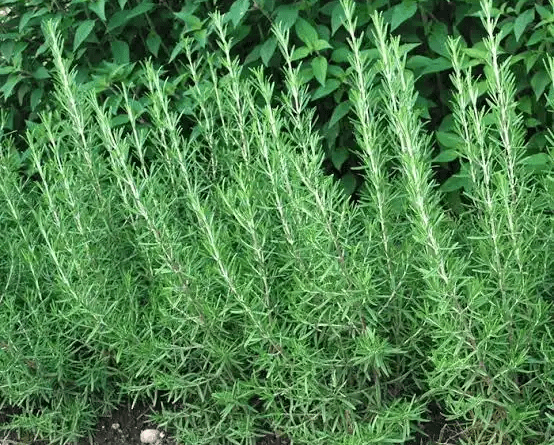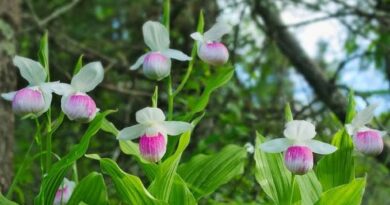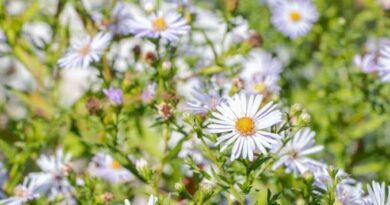16 Medicinal Health Benefits Of Rosmarinus (Rosemary)
Rosemary, or Rosmarinus officinalis, is a fragrant herb native to the Mediterranean region. Its needle-like leaves exude a robust, piney aroma and a savory, slightly bitter flavor. The Latin name “Rosmarinus” means “dew of the sea,” hinting at its coastal origins.
This perennial herb features evergreen foliage, with slender, green-gray leaves arranged in pairs along woody stems. Its name stems from its delicate blue to purple flowers, resembling rose petals. Rosemary thrives in full sun and well-draining soil, making it a popular choice in gardens and kitchen windowsills worldwide.
Culinary enthusiasts appreciate rosemary for its ability to infuse dishes with a distinctive earthy, citrusy essence. It pairs splendidly with roasted meats, vegetables, and even bread, imparting a timeless, aromatic touch.
Beyond cooking, rosemary offers various health benefits, believed to enhance memory and promote digestive wellness.
In addition to its culinary and medicinal uses, rosemary’s aromatic oils find purpose in perfumes, shampoos, and skincare products. Rosemary’s essential oil, extracted from its leaves, possesses a refreshing scent and potential therapeutic properties.
Gardens and kitchens alike owe a debt of gratitude to rosemary, a versatile herb that elevates both flavor and fragrance. Its rich history, tied to ancient Greek and Roman cultures, continues to thrive as an indispensable ingredient in modern cuisine and beyond.
The Botanical Description of Rosmarinus
1. Appearance: Rosmarinus, commonly known as rosemary, is an evergreen perennial herb with narrow, needle-shaped leaves that are dark green on top and silver-gray underneath.
The leaves are arranged oppositely on the stems and exude a pleasant fragrance when crushed. This aromatic herb has a bushy growth habit and can reach a height of up to two meters under ideal conditions.
Its woody stems are sturdy and resilient, making the plant well-suited for various climates.
2. Flowers: Rosmarinus produces small, two-lipped, pale blue to violet flowers that grow in clusters. These flowers bloom in late spring to early summer and are highly attractive to bees and other pollinators.
The delicate blooms add to the plant’s aesthetic appeal and make it a favorite among gardeners.
3. Roots: The root system of Rosmarinus is relatively shallow but spreads wide, enabling the plant to access nutrients efficiently. The roots are well-adapted to dry, rocky soils, allowing the herb to thrive in arid environments.
This adaptability makes Rosmarinus a hardy and resilient herb that can withstand challenging growing conditions.
The Geographic Distribution of Rosmarinus
1. Native Range: Rosmarinus is native to the Mediterranean region, including countries such as Italy, Spain, Greece, and Turkey. It thrives in the unique climate of this area, characterized by hot, dry summers and mild, wet winters.
The herb has been a part of Mediterranean culture for centuries, both for its culinary and medicinal uses.
2. North America: Rosmarinus has been introduced and cultivated in different states of the United States, especially in California, Arizona, and Texas.
The warm, Mediterranean-like climates in these regions provide an ideal environment for the herb to thrive. It is a popular choice in herb gardens and landscapes, adding both culinary and ornamental value.
3. Europe: Apart from its native Mediterranean countries, Rosmarinus is widely grown in various European countries, including France, Portugal, and the United Kingdom.
The herb’s adaptability to different soil types and climates has contributed to its widespread cultivation across the continent.
4. Asia: Rosmarinus has gained popularity in Asian countries such as India and China, where it is cultivated for culinary and medicinal purposes.
The herb’s aromatic leaves and essential oils are valued in traditional medicine and cuisine, making it a sought-after herb in these regions.
The Chemical Composition of Rosmarinus
1. Essential Oils: Rosmarinus is abundant in essential oils, with the main components being camphor, cineole, and alpha-pinene. These essential oils are responsible for the herb’s characteristic aroma and flavor.
They also possess antimicrobial properties, making Rosmarinus a natural preservative and flavor enhancer in food preparation.
2. Phenolic Compounds: Rosmarinus contains phenolic compounds such as rosmarinic acid, caffeic acid, and carnosol. These compounds exhibit strong antioxidant properties, helping to neutralize harmful free radicals in the body. Antioxidants play a crucial role in promoting overall health and reducing the risk of chronic diseases.
3. Flavonoids: Flavonoids, including apigenin, diosmetin, and luteolin, are present in Rosmarinus and contribute to its medicinal properties.
Flavonoids have anti-inflammatory and immune-boosting effects, making Rosmarinus an excellent natural remedy for various ailments. Additionally, they enhance the herb’s overall therapeutic potential.
4. Rosmarinic Acid: Rosmarinic acid, a derivative of caffeic acid, is a key compound found in Rosmarinus. It possesses anti-inflammatory, antimicrobial, and analgesic properties. Rosmarinic acid is widely studied for its potential in treating inflammatory conditions, making Rosmarinus a valuable herb in natural medicine practices.
Rosmarinus, with its botanical beauty, wide geographic distribution, and diverse chemical composition, stands as a remarkable herb with immense culinary, medicinal, and ornamental value.
Its unique combination of essential oils, phenolic compounds, flavonoids, and rosmarinic acid makes it a powerhouse of natural benefits.
Read Also: 8 Medicinal Health Benefits of Rhus taitensis (Tahitian Sumac)
The Medicinal Health Benefits Of Rosmarinus (Rosemary)

Rosemary, scientifically known as Rosmarinus, is not only renowned for its culinary uses but also for its impressive array of medicinal health benefits.
From improving cognitive function to promoting digestion, this versatile herb has been used for centuries in traditional medicine and continues to be a valuable resource for health-conscious individuals. Below, we’ll list and explain 16 medicinal health benefits of Rosmarinus:
1. Cognitive Enhancement: Rosmarinus has been associated with improved memory and cognitive function. It contains compounds that may enhance concentration and focus.
2. Digestive Health: Rosemary is known to alleviate digestive issues, including indigestion and bloating. It promotes the flow of bile, aiding in digestion.
3. Anti-Inflammatory: Its anti-inflammatory properties can help reduce inflammation in the body, potentially benefiting conditions like arthritis.
4. Antioxidant Rich: Rosmarinus is packed with antioxidants that combat free radicals, promoting overall health and potentially reducing the risk of chronic diseases.
5. Respiratory Health: The herb can provide relief from respiratory issues such as congestion and allergies due to its expectorant properties.
6. Stress Reduction: Rosemary may have a calming effect and help reduce stress and anxiety when used in aromatherapy or as an herbal remedy.
7. Pain Relief: It has analgesic properties that can be useful for managing pain, whether it’s from headaches, muscle aches, or arthritis.
8. Hair Health: Rosemary oil is known for its benefits in promoting hair growth and preventing hair loss when applied topically.
9. Immune Support: The antioxidants in Rosmarinus can bolster the immune system, helping the body fight off infections and illnesses.
10. Skin Health: It can be used topically to improve skin complexion and treat conditions like acne and eczema.
11. Anti-Cancer Properties: Some studies suggest that Rosemary may have potential in preventing and treating certain types of cancer.
12. Blood Circulation: Rosemary promotes healthy blood circulation, which is crucial for overall health.
13. Anti-Microbial: It has antimicrobial properties that can help combat various infections.
14. Weight Management: Some compounds in Rosemary may aid in weight management and fat loss.
15. Liver Health: It supports liver function, assisting in detoxification and overall well-being.
16. Anti-Aging: Due to its antioxidant content, Rosemary may slow down the aging process by reducing oxidative stress on the body.
The Methods of Usage to Achieve the Provided Health Benefits Of Rosmarinus (Rosemary)
To uses the medicinal health benefits of Rosmarinus effectively, it’s crucial to understand the various methods of usage. Below, we’ll list and explain the methods of usage to achieve the provided health benefits of Rosemary:
1. Culinary Use: Rosemary is a popular culinary herb, used to flavor a wide range of dishes, from roasted meats to soups and stews. Incorporating it into your diet can provide its antioxidant and anti-inflammatory benefits.
2. Herbal Tea: Rosemary tea is a soothing beverage that can help with digestive issues, stress reduction, and cognitive enhancement. Simply steep fresh or dried rosemary leaves in hot water.
3. Aromatherapy: Inhaling the aroma of rosemary essential oil can have a calming effect, reducing stress and anxiety. Use a diffuser or add a few drops to a bowl of hot water for steam inhalation.
4. Topical Application: Rosemary oil can be applied to the skin for various benefits, including improved skin health and hair growth. Dilute the essential oil with a carrier oil before use.
5. Herbal Preparations: Rosemary can be used in herbal preparations, such as tinctures and salves, for specific medicinal purposes. These can be applied topically or ingested, depending on the intended benefit.
6. Supplements: Rosemary supplements, available in various forms like capsules and extracts, can provide a concentrated dose of its beneficial compounds. Consult a healthcare professional before using supplements.
7. Culinary Seasoning: Adding rosemary to dishes not only enhances flavor but also imparts its health benefits. Use it as a seasoning for roasted vegetables, meats, and more.
8. Hair Care Products: Look for shampoos and conditioners containing rosemary oil or extracts to promote hair health and growth.
The Side Effects Of Using Rosmarinus Medicinal Plant
While Rosmarinus offers numerous health benefits, it’s essential to be aware of potential side effects when using it as a medicinal plant. Below, we’ll list and explain the possible side effects of using Rosmarinus:
1. Allergic Reactions: Some individuals may be allergic to rosemary, leading to skin rashes or respiratory issues when exposed to the herb or its essential oil.
2. Gastrointestinal Upset: In rare cases, excessive consumption of rosemary can lead to stomach discomfort, including nausea, vomiting, and diarrhea.
3. Seizures: High doses of rosemary or rosemary essential oil may potentially trigger seizures in susceptible individuals.
4. Pregnancy and Nursing: Pregnant and nursing women should use rosemary cautiously, as it may have uterine-stimulating effects.
5. Blood Pressure: Rosemary can affect blood pressure, so those with hypertension should monitor their intake.
6. Interaction with Medications: Rosemary supplements or high doses may interact with certain medications, so it’s crucial to consult with a healthcare professional, especially if you are taking medication regularly.
7. Skin Sensitivity: Direct contact with rosemary oil or concentrated preparations may cause skin irritation or sensitization in some individuals.

Read Also: 24 Medicinal Health Benefits Of Xanthium (cocklebur)
The Scientific Research and Studies of Rosmarinus
Rosmarinus, commonly known as rosemary, has been the subject of various scientific research and studies. The research focuses on its potential health benefits, culinary uses, and applications in traditional medicine. Here are some key areas of scientific investigation regarding Rosmarinus:
1. Medicinal Properties: Researchers have examined the medicinal properties of Rosmarinus, including its anti-inflammatory, antioxidant, and antimicrobial effects.
Studies have shown that compounds like rosmarinic acid and carnosic acid in rosemary may contribute to these properties.
2. Cognitive Function: Some studies have explored the potential cognitive benefits of Rosmarinus, suggesting that the aroma of rosemary may improve memory and concentration. The mechanisms behind these effects are still being investigated.
3. Anticancer Potential: There is ongoing research into the anticancer properties of Rosmarinus. Some studies have indicated that certain compounds in rosemary may inhibit the growth of cancer cells, but more research is needed to fully understand its role in cancer prevention and treatment.
4. Culinary Uses: Rosmarinus is a popular herb in cooking. Research has focused on its culinary applications, including flavor enhancement and preservation of food. It is often used as a seasoning in various dishes.
The Safety Precautions and Recommendations In Using Rosmarinus Medicinal Plant
While Rosmarinus has potential health benefits, it’s essential to use it safely. Here are some safety precautions and recommendations for using Rosmarinus as a medicinal plant:
1. Allergies: Individuals with known allergies to the Lamiaceae family, which includes Rosmarinus, should avoid its use. Allergic reactions may include skin rashes, itching, or respiratory symptoms.
2. Dosage: When using Rosmarinus as a supplement or remedy, it’s crucial to follow recommended dosage guidelines. Excessive consumption can lead to adverse effects.
3. Pregnancy and Nursing: Pregnant and nursing women should consult with a healthcare professional before using Rosmarinus medicinally, as it may have effects on pregnancy and breastfeeding.
4. Medication Interactions: Rosmarinus can interact with certain medications, potentially affecting their effectiveness. Consult with a healthcare provider if you are taking prescription drugs.
5. Essential Oil Use: When using Rosmarinus essential oil topically, always dilute it with a carrier oil to avoid skin irritation or sensitization.
FAQs About Rosmarinus Medicinal Plant
Here are 18 frequently asked questions (FAQs) about Rosmarinus, along with explanations for each question:
1. What is Rosmarinus?
Rosmarinus, commonly known as rosemary, is a fragrant herb used in cooking and traditional medicine.
2. What are the medicinal properties of Rosmarinus?
Rosmarinus exhibits anti-inflammatory, antioxidant, and antimicrobial properties.
3. Can I use Rosmarinus for memory improvement?
Some studies suggest that the aroma of rosemary may enhance memory and concentration.
4. Is Rosmarinus used in cancer treatment?
Research is ongoing regarding its potential anticancer properties, but it’s not a primary treatment.
5. How can I use Rosmarinus in cooking?
Rosmarinus is a versatile herb used for flavoring various dishes, such as meats and soups.
6. Are there any allergic reactions associated with Rosmarinus?
Some individuals may experience allergic reactions, such as skin rashes, if they are allergic to the Lamiaceae family.
7. Can pregnant women use Rosmarinus?
Pregnant and nursing women should consult with a healthcare professional before using Rosmarinus medicinally.
8. Does Rosmarinus interact with medications?
Rosmarinus may interact with certain medications, so it’s essential to consult with a healthcare provider.
9. How should I use Rosmarinus essential oil on my skin?
Always dilute Rosmarinus essential oil with a carrier oil to avoid skin irritation.
Read Also: Sources and Types of Water Pollution









